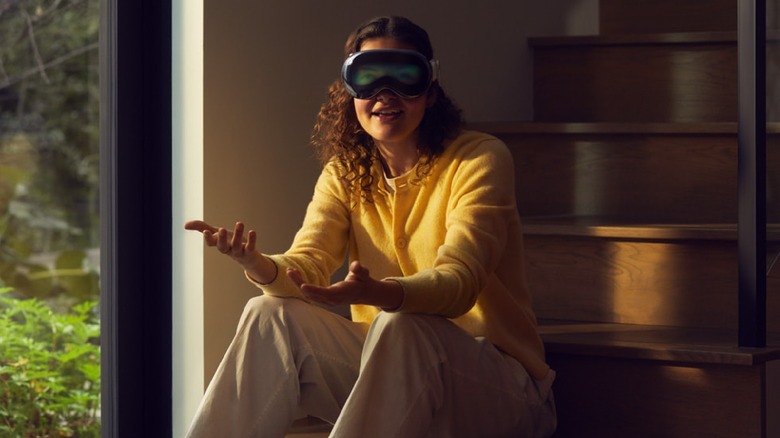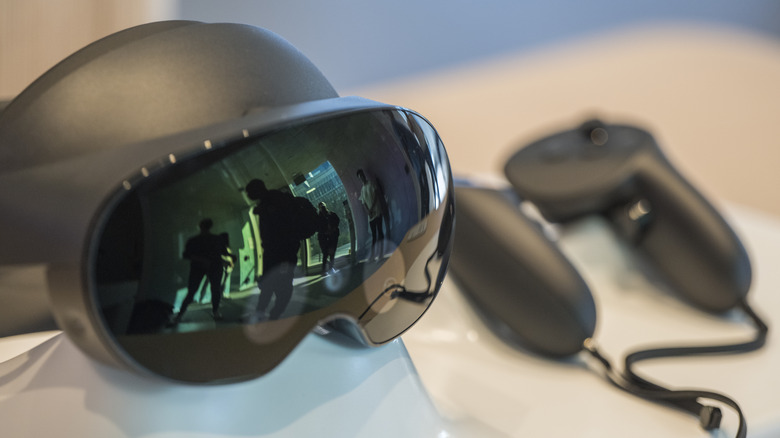Apple Needs To Hear Zuckerberg's Thoughts On The Vision Pro: Here's Why
Mark Zuckerberg has posted a scathing review of the new Apple Vision Pro headset. In a Reel shared on his Instagram, Meta's CEO lists the reasons why he believes that the Quest 3 and Quest Pro are better products — even if you ignore the enormous price discrepancy.
Love him or hate him, Zuckerberg obviously has a big interest in VR and the funds to push that interest to the limits. Meta has pumped billions into VR development without a lot of return, yet keeps funneling money into the effort. The main driving force for that funding seems to be Zuckerberg's deeply held belief in the concept, along with his idea for a Metaverse. There have been pitfalls along the way, but the Meta team probably knows more about the VR industry than any other group of people on Earth at this point. As well, Zuckerberg has access to that information and likely has the drive to pour over it obsessively.
In light of that, when the man speaks about AR and VR, then it makes sense to listen if you have interests in those industries — even if Zuckerberg likely sees Apple as both a direct competitor and a major player entering into a space his company has so far dominated. He seems slightly annoyed during the video and is obviously passionate about his points. The billionaire gets a lot right, but there are a few things he either overlooks or gets wrong, too.
What Zuckerberg is right about
Zuckerberg repeatedly highlights the price difference between the two devices ($499 vs $3,499), and that may be a key point when the dust settles. The Vision Pro is over seven times the price of a Quest 3, and even if you disagree with some of Zuckerberg's points, you'll still be hard-pressed to say that the Vision Pro is seven times the headset that the Quest 3 is.
The billionaire states that he finds Quest a lot more comfortable, and highlights the lack of wires. The Vision Pro isn't tethered to any device but does have a long wire leading to its battery. Given that the Vision Pro is designed to be worn for long periods, comfort is paramount. The fact wearing a headset for more than a couple of hours can cause severe discomfort is one of the main things stopping people from using such devices for work and entertainment. Facebook's founder also highlights the lack of input devices on the Vision Pro. While the hardware may support VR games if the software is tweaked to allow it, many titles are still unplayable with hand tracking alone. Unless Apple releases some controllers down the line, the Vision Pro's usage will remain limited.
Meta has indeed noticed a lot of Quests gathering dust on shelves, despite the platform having more top-level content than any of its competitors. So Zuckerberg's point about the Vision Pro's lack of AR and VR-specific content may indicate a major flaw in Apple's game plan. The content will more than likely come in time, but it is a major issue at launch. Yes, a big virtual screen is nice, but it's really not getting the most out of the platform, or even playing to its strengths.
Is there anywhere Zuckerberg misses the mark?
While it was mostly accurate, Zuckerberg's spiel did miss the point in a couple of areas. The first centers on the wider usability of the Quest platform. The Vision Pro is indeed worse for gaming and has fewer dedicated AR and VR apps. This seems to be by design more than anything. Apple is shooting for a headset people will use while standing or sitting at a desk or relaxing on a couch. It's for watching movies, not fighting virtual goblins. While valid, the content-related jab may not apply forever. The Vision Pro has only been out for a brief period. It has the hardware for great AI, including things like LiDar and a built-in depth sensor. The content will come, it just takes a little time.
The second place Zuckerberg misses the mark is on the resolution front. While the Quest 3 looks great and has all but eliminated the "screen door effect," it's still not perfect. When it comes to fooling the brain and immersing people in XR, resolution has a tremendous impact. You can see this on the Quest platform itself. Compare a Quest 2 to a Quest 3 and the difference is mind-blowing. He also omitted the fact that the Vision Pro has mini-OLED displays. The original Quest had OLED displays, but these were ditched as a cost-cutting measure. This style of display allows for truer blacks, which makes a huge difference in VR.
On a different note, while the Quest 3 has a very good passthrough camera as stated during the Reel, Zuckerberg's video does seem both sharper and smoother than what we saw when we tested it in 2023. We're not saying Meta cheated, as numerous factors play into overall video quality. But Zuckerberg's video really does seem like a best-case scenario.
Which headset will win overall?
When it comes to VR and AR, the Quest platform absolutely dominated the market. Quests accounted for 84% of all headsets shipped worldwide in Q4 2022. The only real competitor is Sony's PS VR platform, and that has nowhere near the Quest's functionality. It also requires a PlayStation console. Given its price point — and the fact you either love Apple or you don't — the Vision Pro has very little chance of significantly chipping away at this market share. We aren't going to see an iOS/Android situation, where Apple holds the majority of the market in many developed countries.
But it's also fair to say that the headsets were never in direct competition. The price gap is enormous, the intended audience seems to be different, and both devices technically serve different functions. So it's difficult to judge the Vision Pro based on market share, or even sales numbers. Apple seems to be attempting to establish its own take on the platform, and it might well do that — even if it doesn't shift millions of units and directly challenge Meta's iron grip over the entire VR industry.



